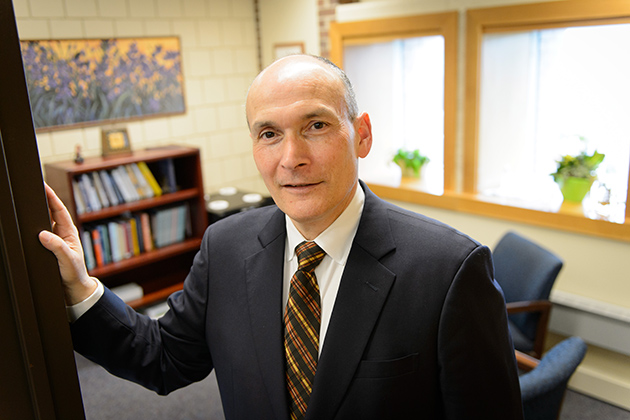
In its first year after being re-established, UConn’s Ombuds Office has become an accepted resource for employees and graduate students to help them work through a variety of questions and concerns about their work lives.
The Ombuds Office recently released its first annual overview report, outlining information about the number of visitors, the kinds of concerns they raised, and the types of assistance offered by the office.
Despite being a new service on campus, UConn Ombudsman Jim Wohl says, about 3.4 percent of UConn’s faculty and staff used the office in the first year – falling right within the range of the approximate 1 percent to 5 percent usage rates typical at ombuds offices at other colleges and universities.
“There has been a lot of institutional support, and the statistics show that the University as a whole has been receptive to having an ombuds here and [employees and graduate students] are increasingly aware of ways in which it can be beneficial to their work lives,” Wohl says.
An ombuds office helps workers find strategies and solutions to workplace difficulties, improving their on-the-job experiences and the operations and climate of the institution as a whole. The process is confidential, neutral, informal, and independent of other University offices.
A new service on campus
Wohl joined UConn in early 2013 as its ombudsman, coming to Storrs from his previous position as university ombudsperson and professor of veterinary medicine at Auburn University.
The UConn Ombuds Office was previously in place from 1970 to 1991, and was re-established by President Susan Herbst in 2013. In her message to the campus community at that time, Herbst described the office as being “committed to promoting fair practices and fostering integrity and timeliness in the administration of University policies and practices affecting our work.”
According to Wohl’s first-year report, 214 of the University’s faculty members, staff, and graduate students contacted the Ombuds Office in the 2013-14 fiscal year for individual consultations, help with problem solving, assistance in facilitating a discussion with another person, or other help.
… the goal is to reach a resolution that all sides can work with so everyone can move forward. — Jim Wohl, UConn Ombudsman
Wohl noted that statistics on the number of visitors to any ombuds office don’t indicate that a workplace has systematic problems. Rather, he said, the nature of any large organization – with many different personalities, work styles, and career visions – means it is natural that disagreements or other concerns will arise.
“What we tell people is that the office is a hub where you can get assistance to solve problems,” he said. “There may be compromises, or the solution may not be exactly what they wanted, but the goal is to reach a resolution that all sides can work with so everyone can move forward.”
Timely assistance
About 85 percent of the visitors who came to Wohl’s office in 2013-14 wanted to discuss a concern before it reached the stage of becoming a formal dispute, a statistic he said was a promising indicator of people’s willingness to address issues early in the process before they escalated.
In fact, he said, he noticed that as the office became more established and people became more familiar with its role, there was a growth in the number of requests for him to help by sitting down with two or more people to informally facilitate their conversations. There’s also been an increase in the number of people contacting the office because a colleague suggested it could be helpful.
He said it brings him great professional satisfaction to assist with a productive dialogue that leads to a successful conclusion, and that his role has helped him learn a great deal about the work being performed in offices and programs throughout the UConn system.
His work during the 2013-14 budget year included almost two dozen trips to make presentations and meet with people at UConn’s regional campuses and extension offices. And he said that although UConn Health has a personnel system that is unique to their campus, he has welcomed inquiries from their employees if they think his services may be helpful.
Although the majority of the visitors to Wohl’s office in 2013-14 were unionized UConn employees, Wohl emphasized the Ombuds Office neither replaces nor supersedes any procedures or protections in bargaining unit contracts. He does not conduct investigations or arbitration, serving instead as an impartial resource.
“Working in a highly unionized environment was new for me, but what I discovered is that the role the bargaining units play really enriches the work,” he said. “It creates more possibilities for informal dispute resolution. The more options one has, the better chance one can find a strategy that meets the interests of those involved.”
And although about 15 percent of the visitors already were in a formal dispute process – such as having filed a grievance – Wohl says the Ombuds Office can play a valuable role in those circumstances too, to help all sides move forward productively once that process is over.
The UConn Ombuds Office is located on the second floor of the Homer Babbidge Library, in rooms 2-189 and 2-191 of the Jausz Family Reading Room of the Art and Design Library.
Wohl invites University employees and graduate students to call him at 860-486-5143 to learn more about how his services can help or to schedule an appointment to talk in person.


